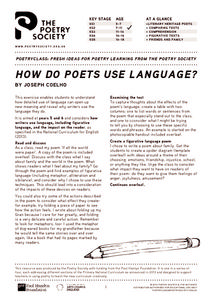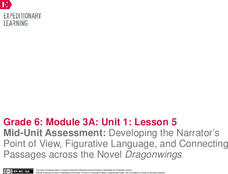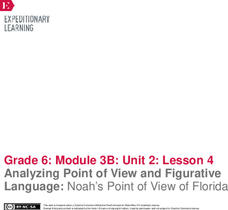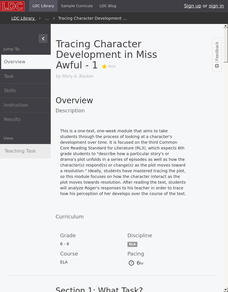Curated OER
Stellaluna Lesson: Increase Oral Language Development and Story Comprehension
To be used with the BRAIDY system, this lesson works to increase oral language and reading comprehension. Special needs pupils review parts of a story, sequence of events, and create a Venn diagram showing the differences between birds...
Forum
A Research Toolkit of 12 Reading Strategies for the Foreign Language Classroom
Learning to read is not a simple task, but there are methods for assisting pupils as they develop literacy skills. The first four pages of this resource include information about language development and reading development, as well as...
ReadWriteThink
Style-Shifting: Examining and Using Formal and Informal Language Styles
Your high schoolers are probably versed in two languages: formal language, and informal conversation. Help them identify the correct language style for their audience and context with a thorough lesson and examples of different speech...
Curated OER
ASL Lesson 8
Another awesome ASL lesson! Teach ASL to a special ed class, hearing impaired child, or for your own enrichment. This lesson provides comprehensible ASL language development. Each highlighted blue area links to a video, printable image,...
Center for Open Educational Resources and Language Learning
Reading Activity
Ready to integrate technology into your ELL instruction? Check out this reading lesson plan that has language learners using the Internet and apps, joining online book clubs, and creating blogs. A fine model of what can be done.
EngageNY
Planning Ideas: Developing a Colonial Character Profile
The second lesson in a historical fiction series encourages pupils to develop a character profile of a colonial person using research acquired in the previous unit. Learners prepare their historical fiction narrative by responding to a...
EngageNY
Close Reading of Bullfrog at Magnolia Circle: Main Ideas about the Bullfrog
As your class reaches the end of the book Bullfrog at Magnolia Circle, the seventh lesson in this literary unit helps third graders transition from reading narrative to expository writing. Scholars develop their note-taking skills...
Poetry Society
How do Poets Use Language?
Why do writers choose the language they do? Here's a resource that has the poet himself answer that very question. Joseph Coelho explains why he chose the words and images he used in his poem, "If All the World Were Paper."
EngageNY
Developing Reading Fluency: Beginning the End of Unit 2 Assessment
Third graders continue to develop their reading fluency in preparation for their assessment in the tenth lesson plan of this unit. Young readers are provided with a short passage on Helen Keller, which they use while working in pairs...
EngageNY
Identifying Main Ideas and Supporting Details: What’s Going On in the Teenage Brain?
What's going on in the teen brain? Pupils consider the question as they continue reading an informational article about the topic. While reading, they use a Thinking Log worksheet and an anchor chart to track their understanding of...
CC Homestead
Summarize
Designed for third graders but appropriate for older learners as well, this packet of materials underscores the necessity of teaching kids how to summarize, how to identify main ideas and supporting details, and how to ask questions...
American English
Welcome to the Color Vowel Chart
Focus English language learners' attention on word stress and phrase stress with a pronunciation chart that breaks the sounds into moving and non-moving vowel sounds. The chart tool uses colors and key words to indicate...
Curated OER
Developing Presentation Skills by Using Authentic Literature
Advanced level ESL students engage in an increasing verbal communication skills through children's literature. The focus of these activities is for children to develope presentation skills. Each activity would compliment any class room.
Curated OER
The Study of Theme and Figurative Language in Poetry and/or Prose
Identify and analyze the use of figurative language used in select pieces of writing. These pieces of literature will represent at least two pieces by one writer and at least two pieces by different writers. This lesson would be a great...
Curated OER
Setting the Tone with Figurative Language
Explore figurative language with your secondary class. Extending a language arts unit, the lesson prompts middle schoolers to examine how an author's word choice establishes a story's tone, possibly using metaphors, similes,...
EngageNY
Summarizing Complex Ideas: Comparing the Original UDHR and the "Plain Language" Version
The eighth lesson plan in this series continues the focus on vocabulary and increasing young readers' awareness of academic language. Pairs of learners participate in a short vocabulary review activity called Interactive Words in which...
Curated OER
Two Greedy Bears
Improving listening comprehension skills is the goal of this language arts lesson. Young readers listen to the story Two Greedy Bears, stopping to have discussions with a partner. They predict outcomes and make inferences based on...
Catholic Charities
Telephone Skills
The challenge in telephone conversations is that speakers and listeners cannot rely on body language to communicate. This 31-page packet includes a curriculum guide, lesson plans, assessments, and resource lists designed to help...
EngageNY
Grade 9 ELA Module 1, Unit 1, Lesson 3
Just like in real life, characters in short stories show their true personalities through their words and deeds. Decipher the character development in Karen Russell's "St. Lucy's Home for Girls Raised by Wolves" with a set of activities...
EngageNY
Grade 9 ELA Module 1, Unit 1, Lesson 9
Find the central idea in an excerpt from Karen Russell's "St. Lucy's Home for Girls Raised by Wolves" with a literary analysis instructional activity. As your class analyzes a section of the story, they determine how the author forms the...
English Enhanced Scope and Sequence
Differentiate between Formal and Informal Language
The Pledge of Allegiance, the Gettysburg Address, the National Anthem, and the Preamble to the Constitution all get close attention in an exercise that asks learners to rewrite these formally-worded documents into informal language....
EngageNY
Mid-Unit Assessment: Developing the Narrator’s Point of View, Figurative Language, and Connecting Passages across the Novel Dragonwings
Let's get creative! As part of a mid-unit assessment, scholars create a piece of artwork illustrating the theme from Laurence Yep's novel, Dragonwings. Additionally, pupils use a graphic organizer to identify figurative language in...
EngageNY
Analyzing Point of View and Figurative Language: Noah’s Point of View of Florida
Fishing for words. Scholars search for unfamiliar words in pages 27-29 of Flush, place them in their word catchers, and complete part of Noah’s Point of View graphic organizer. After identifying figurative language, learners analyze...
Literacy Design Collaborative
Tracing Character Development in Miss Awful
Scholars take a close look at Roger in Miss Awful. As the plot develops, readers track Roger's perceptions of his substitute teacher. Learners then discuss how Roger's actions toward the substitute changes as the story progresses before...
Other popular searches
- Oral Language Development
- English Language Development
- Language Development Ese
- Second Language Development
- Whole Language Development
- Drama Language Development
- Language Development Lessons
- Early Language Development
- Language Development Written
- Esl Oral Language Development
- Esl+oral Language Development























